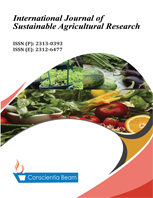In vitro ixodicidal action of a concentrate based on plant oils on rhipicephalus microplus engorged female ticks
DOI:
https://doi.org/10.18488/ijsar.v10i3.3423Abstract
R. microplus is an obligate hematophagous ectoparasite of cattle that causes billions of dollars in losses in the global livestock economy and thus we evaluate the efficacy of a concentrate, using vegetable oils on the mortality of engorged female R. microplus ticks. For each group, 15 ticks were used and assigned to four treatments: T1-T4 and a control group (CG), that were not exposed to the extract at all. The ticks were immersed in each treatment for a period of 15 minutes. Upon completion, the specimens were removed from the container and the excess of product was removed using blotting paper. To determine mortality, the ticks were placed in Petri dishes and left to rest inside an extraction hood at 31.6 °C and 56% relative humidity and were observed every 24 hours for seven days. In the T1, mortality was 73% at 48 h post-treatment, while in the T2 - T4 groups, mortality was 100% at 24 h. The result shows that mixed vegetable oil extracts are a viable alternative for the control of R. microplus. We suggest further studies on its efficacy in vitro and in vivo using lower concentrations.

